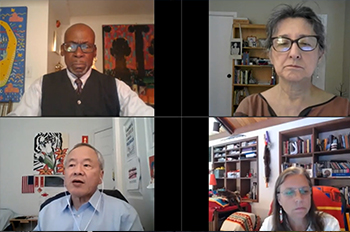As the United States turns more attention to addressing its long history of systemic racism, NASW has released a comprehensive report called Undoing Racism Through Social Work: NASW Report to the Profession on Racial Justice Priorities and Action.
In announcing the document, NASW held a virtual town hall on June 17 to also commemorate Juneteenth, which President Joe Biden signed into law as a federal holiday.

“NASW Town Hall Series on Racial Equity: Undoing Racism” featured an opening statement from NASW President Mildred “Mit” C. Joyner. She noted that NASW, in its journey of addressing racism, is taking another deliberate and purposeful step in releasing the report.
“Social work is unique in its dual focus of enhancing well-being and championing social justice,” she said. “Yet, our profession’s history is linked to many shameful chapters in America’s untold stories.”
The social work profession has contributed to ongoing discrimination and oppression of people of color through its systems, policies and practices, she said.
“The report’s first section acknowledges that the social work profession has not always lived up to its mission of pursuing social justice for all and apologizes for our role in policies and actions that harm people of color,” Joyner said. The second part of the report outlines NASW’s efforts on racial justice advocacy over the past year and its priorities for the coming year.
Gary Bailey, former NASW president and a professor of practice at Simmons School of Social Work and at the Simmons School of Nursing, moderated the town hall. He said the report should serve as a historic document.
Joining in the discussion was panelist Janlee Wong, former executive director of the NASW California Chapter, who has worked on many social justice and anti-racism efforts during his tenure.
“We owe a huge debt to the Black Lives Matter movement,” Wong said. Over time, social work has had to come to grips not only with what it is trying to do today, but also do some soul searching, and examine whether it was complicit, he said.
“Growing up in California, Juneteenth was not mentioned in my textbooks or by my teachers, nor did I learn about it in college,” Wong said. “It was only after I joined NASW and started attending Juneteenth celebrations that it became clear to me that no one is truly free until all of us are free.”
This past year, NASW efforts to address racism and racial justice involved volunteers across the association actively issuing public statements, and conducting town halls and essential chats, Wong said. “The town halls were a way to hear the authentic voices and inform NASW’s actions.”
This past year’s efforts at the national and chapter levels included public statements and numerous town halls — specifically, four of the statements and two of the town halls that acknowledged social work’s history of racism and called for the end of hate, racism and violence.
NASW also collaborated with other social work organizations to build alliances and coalitions to fight racism and seek justice. These include: The National Association of Black Social Workers, the Council on Social Work Education, the Association of Social Work Boards, and the National Network of Social Work Management.
Panelist Karina Walters is an enrolled member of the Choctaw Nation of Oklahoma, associate dean for research, the Katherine Hall Chambers Scholar, and the co-director and principal investigator of the Indigenous Wellness Research Institute at the University of Washington
Walters noted that President Biden said every generation has to re-establish a basis in the fight for democracy. The statement was a response to states establishing new voter laws that experts say disenfranchise people of color.
“What this means for social work educators is that we need to engage students in re-establishing their own guiding principles and beliefs for their generation,” said panelist Yolanda Padilla, a professor of social work and women’s studies at The University of Texas at Austin, and director of the Center for Diversity and Social & Economic Justice, a center of the Council on Social Work Education.
When it comes to teaching future generations about racism, Walters said, “We have to look at how structural racism and settler colonialism intersect. We have to think deeply how structural racism is a mechanism of colonialism, and how undoing racism does not get rid of settler colonialism. Because settler colonialism is the fuel, it is the fire that keeps things going. It just changes its face in clever ways.”
“Social work is at a point of great power and I hope we use that wisely,” she added.
Padilla said she is pleased to see NASW acknowledge its past. “Truth-telling opens the door to change. There are many social workers helping people navigate impossible situations.”
She said she is always amazed at the resourcefulness of social workers who make things work for the people they serve.
“Truth-telling is so important,” Wong said. “It doesn’t just apply to history; it also applies to now.” Social workers are in settings where they need to step up and be the truth-tellers, he added.
NASW CEO Angelo McClain offered closing remarks. “I am hopeful today will be a reference point for our profession where we can say on Juneteenth 2021, we put a stake in the ground to acknowledge our complicity to racism, the perpetuity of racism, and we put a stake in the ground that says we are sorry for those sins and we put another stake in the ground that says... we are going to do better,” he said. “We are going to be part of making sure we achieve racial equity in our country, in our lifetime.”
Watch a recording of the “NASW Town Hall Series on Racial Equity: Undoing Racism”